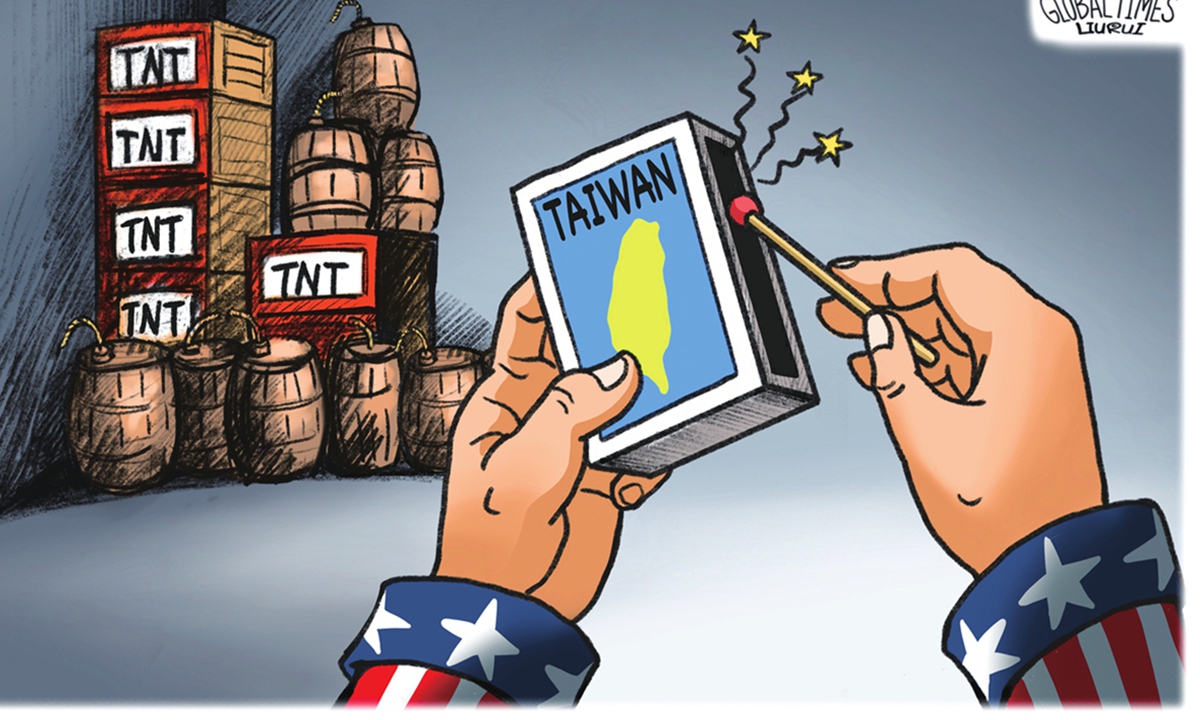
Illustration:Liu Rui/GT
Despite the military exchanges between the US and Taiwan's Democratic Progressive Party (DPP) authorities, and despite their provocations against the Chinese mainland, it will not change the fact that the Chinese mainland's military power is overwhelmingly superior to that of Taiwan island. Colluding with the US will only put the island's secessionists in an increasingly dangerous position.
The Financial Times reported Monday that a US military delegation made a "low-key" visit to Taiwan in November to assess the island's military strength and explore the benefits for Taiwan's military to engage in closer cooperation with Washington. According to the article, the delegation aimed to strengthen Taiwan's defenses enough to deter the mainland from attempting a military attack.
This echoed the announcement Taiwan leader Tsai Ing-wen made last week to extend the period of mandatory military service for all eligible men from four months to a year. Xin Qiang, director of the Taiwan studies center with the Shanghai-based Fudan University, told the Global Times that such a decision was made to boost Taiwan's own military strength against the mainland - in other words, to use force to resist reunification and seek "independence," rather than relying solely on the promised support from the US.
Some have argued US' urge or even pressure played a particular role in Taiwan's military service extension. For Washington, making Taiwan take more responsibility for itself can, to some extent, reduce the burden on US politics and finance. This is a way to continue provoking a confrontation between the two sides of the Taiwan Straits at a much smaller cost.
In the National Defense Authorization Act for Fiscal Year 2023, signed into law by US President Joe Biden on December 23, the White House authorized $10 billion in security assistance and $2 billion in military loans to the Taiwan region over the next five years.
Offered military loans, Taiwan is asked to pay for a "protection racket" presented by Washington, which plans to protect the island half-heartedly. According to Xin, the US believes it should not give Taiwan grants since the island does not lack money. On the contrary, military-industrial complex hopes to rake in from the island of Taiwan - a significant customer of US arms.
It is vicious of the US to play the Taiwan card to stir up infighting within the Chinese nation while the US just sits back and enjoys the benefits. Compared to that, the DPP authorities appear to be pathetic and abominable.
The island's authorities know it has to stick closely to Washington since the latter supports it to resist reunification. What the DPP can do is solicit foreign support, particularly from the US. In addition, the Taiwan authorities use the issue of US arms sales to persuade people on the island that the US will always have their back. As a result, provocations from "Taiwan independence" forces may escalate further.
However, Taiwan is nothing more than just a pawn of Washington. The DPP is spending the Taiwan residents' money to defend the interests of US hegemony and help the US to realize its goal of containing China.
The US and Taiwan island will not stop their collusion anytime soon. Experts anticipate more moves from Washington to challenge the one-China principle in 2023, such as stepping up arms sales and more Taiwan trips from US politicians. And this will only place the island of Taiwan in a more insecure position, as the collusion will only force the mainland to strengthen its military deterrence against the island as a countermeasure. This is no good news for the already shaking cross-Straits relations.
As some foreign media outlets reported on Monday, the Chinese mainland sent 1,727 planes near Taiwan in 2022, nearly doubling the number in 2021. The increase is a normal reaction to Washington's provocative actions on the Taiwan question. It should have also sent a clear and powerful signal to the US and Taiwan secessionists: If they keep strengthening military cooperation or their relations substantively, the PLA will make more moves than sending warplanes near the island.
As time goes by, it will only become more and more difficult for the US to play the Taiwan card to suppress China and for the DPP authorities to seek independence by colluding with foreign forces. "No matter what kind of weapons and equipment the US sells to Taiwan island, there is no way to shake the strength and determination of the Chinese military to solve the Taiwan question, or for Taiwan to use military force to resist reunification," noted Chinese military expert and TV commentator Song Zhongping.

